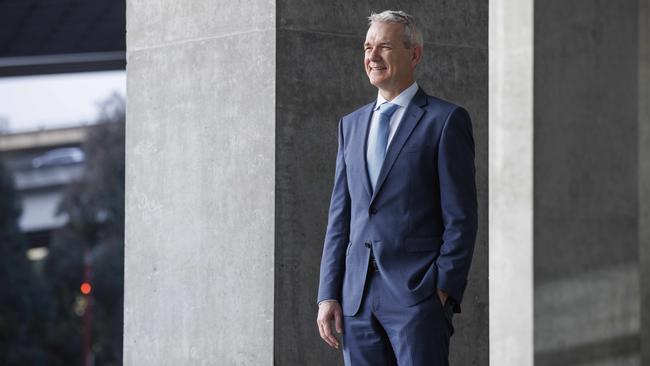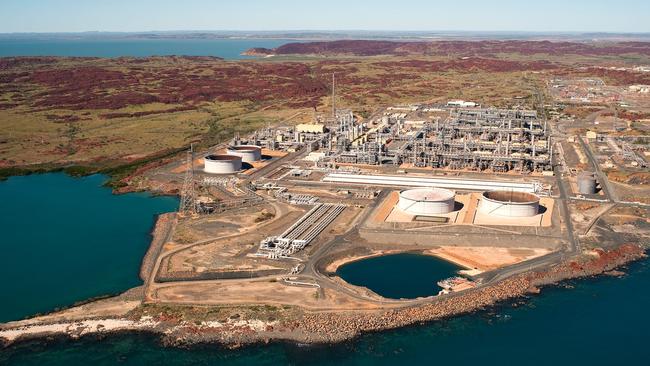BHP veteran Graham Tiver takes on Woodside Energy CFO challenge
A $40bn merger with Woodside Energy has seen BHP’s former finance executive Graham Tiver jump ship with a huge project pipeline ahead to tackle.

Graham Tiver remembers his first experience as a new kid out of school. It was 1994, he’d snagged an accounting traineeship with BHP and landed in the Pilbara mining town of Newman.
Iron ore boss Dick Carter convened a meeting with a bold prediction: “There’s this new market opening up and we think it’s going to be big: it’s called China.”
Tiver remembers the buzz of excitement. “I still remember those words and this sense we were going to go after the market. I found the industry absolutely fascinating. And from those early days in Newman I could see how it worked from the bottom up.”
After a near 30-year career with the Big Australian through a career that’s included stints in Santiago, Kalgoorlie and Los Angeles, Tiver has returned to his home town of Perth after landing the biggest corporate gig of his career as Woodside Energy’s chief financial officer.
Tiver was part of BHP’s inner circle working on its $40bn petroleum merger with Woodside, and admits the original pitch caught some off-guard.
“Petroleum has had a long and very proud history within BHP for 50 years-plus. I think it came as a little bit of a surprise to BHP folk across the organisation.”
But much like a quarter century earlier, Tiver could see the opportunity for Australia’s biggest energy company to move beyond its West Australian base and become a global operation.
Having spent time in BHP’s petroleum headquarters in Houston, Tiver successfully put his name in the hat to take on finance chief duties at the $66bn Woodside under newly crowned chief executive Meg O’Neill.
After watching China’s insatiable appetite for iron ore transform the fortunes of BHP, Tiver landed at Woodside in February during one of the most dramatic upheavals of the gas industry in a generation.
Russia’s invasion of Ukraine squeezed the global energy sector, delivering windfall profits and a cash bonanza for Woodside which has come at a time of huge funding needs for the business.
Juggling the new balance sheet and ensuring shareholders remain rewarded has been a crucial focus for Tiver during his first six months in charge.

Some $US9bn ($13bn) in capital spending is tipped between now and 2024 for its big capital projects, including Pluto 2 and Scarborough in Western Australia, and Sangomar in Senegal.
“Bringing the BHP assets into the Woodside portfolio changes our balance sheet dramatically. We bring cash flow-generating assets on, they come on debt-free – and that completely changes our balance sheet,” Tiver said. “Being able to find that balance in our capital management and continuing to invest in our value add projects, such as Sangomar and Scarborough, while also maintaining strong shareholder returns has been really important.”
The Perth-headquartered company’s $US1.09 payout to shareholders marked its highest interim dividend since 2014 and was at the top end of its range, with investors now seeking to understand how the producer will balance investment with payouts.
Tiver has been through enough commodity cycles to realise the current environment and record LNG prices will not last.
“In these current, very volatile markets, we also have to think about what we do with that cash. And we’ll look at that in a very disciplined manner. Do we continue to invest in those longer shareholder returns? Or do we put it back into special dividends or share buybacks?
“Our investors are saying loud and clear that they like what we’re doing with the balance sheet in that we’ve had a nice balanced approach to be able to navigate the significant capital spend through some very volatile times, and then being able to still match that with shareholder returns,” Tiver added.
A huge backlash against its climate plan, with a 49 per cent protest vote at its annual general meeting, has also underlined just how much lies ahead for Woodside’s board and management, with investors raising issues over Scope 3 emissions disclosure of its customers and carbon offsets.
Woodside has previously said it has no current plans for a Scope 3 goal and could contribute by creating lower-emission energy sources for its customers and building up its new energy business, where it plans to spend $US5bn by 2030.
“We look at it from the point of view of our Scope 1 and 2, and also as a part of our new energy business as a part of dealing with Scope 3,” Tiver said. “Ideally we’ll be able to demonstrate through our actions in our new energy business that we are actively contributing to the Scope 3 as we move forward.” While critics of the company have pointed to International Energy Agency warnings to limit new fossil fuel investments, Tiver said new upstream investment under its net zero scenario was still needed this decade to meet demand.
“There will be continued investment in oil and gas while the world is calling for that energy. Certainly security of supply is a really important conversation at the moment and we think we’re really well positioned to provide long-term secure forms of energy,” he said.
Longer-term, Tiver sees hydrogen, renewables and carbon management growing into a substantial business.
“There’s no expectation that we can turn this business on tomorrow and have something that matches the scale of an Australian or international operations. This is something that we want to build out over 10 to 15 years, offering us a formal diversification and resilience in our business model. So it is very, very important to this period as we move forward.”





To join the conversation, please log in. Don't have an account? Register
Join the conversation, you are commenting as Logout